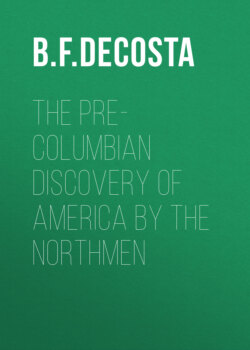Читать книгу The Pre-Columbian Discovery of America by the Northmen - B. F. DeCosta - Страница 10
На сайте Литреса книга снята с продажи.
TRADITIONS.
ОглавлениеThere was even a tradition that America was visited by St. Columba,[13] and also by the Apostle St. Thomas,[14] who penetrated even as far as Peru. This opinion is founded on the resemblance existing between certain rites and doctrines which seem to have been held in common by Christians and the early inhabitants of Mexico. The first Spanish missionaries were surprised to find the Mexicans bowing in adoration before the figure of the cross, and inferred that these people were of a Christian origin. Yet the inference has no special value, when we remember that Christianity is far less ancient than the symbol of the cross, which also existed among the Egyptians and other ancient people.
Claims have also been made for the Irish. Broughton brings forward a passage in which St. Patrick is represented as sending missionaries to the Isles of America.[15] Another claim has been urged of a more respectable character, which is supported by striking, though not conclusive allusions in the chronicles of the North, in which a distant land is spoken of as "Ireland the Great." The Irish, in the early times, might easily have passed over to the Western continent, for which voyage they undoubtedly had the facilities. And Professor Rafn, after alluding to the well known fact that the Northmen were preceded in Iceland by the Irish, says, that it is by no means improbable that the Irish should also have anticipated them in America. The Irish were a sea-faring people, and have been assigned a Phenician origin by Moore and others who have examined the subject.[16] If this is so, the tradition would appear to be some what strengthened. Even as early as the year 296, the Irish are said to have invaded Denmark with a large fleet. In 396, Niall made a descent upon the coast of Lancashire with a considerable navy, where he was met by the Roman, Stilicho, whose achievements were celebrated by Claudian in the days of the Roman occupation of England. At that period the Irish were in most respects in advance of the Northmen, not yet having fallen into decline, and quite as likely as any people then existing to brave the dangers of an ocean voyage.[17] The Icelandic documents, possibly referring to the Irish, will be given in their proper place, and in the meanwhile it need only to be added that the quotation given by Beamish from such an authority as the Turkish Spy will hardly tend to strengthen their claims, especially where its author, John Paul Marana, says that in Mexico "the British language is so prevalent," that "the very towns, bridges, beasts, birds, rivers, hills, etc., are called by the British or Welch[18] names."[19] In truth, as the wish is so often father to the thought, it would be an easy task to find resemblance in the languages of the aborigines to almost any language that is spoken in our day.
But notwithstanding the probabilities of the case, we have no solid reason for accepting any of these alleged voyages as facts. Much labor has been given to the subject, yet the early history of the American continent is still veiled in mystery, and not until near the close of the tenth century of the present era can we point to a genuine trans-Atlantic voyage.
